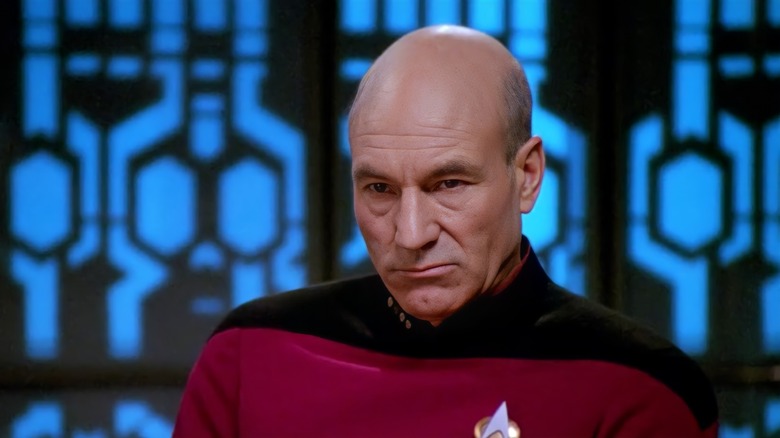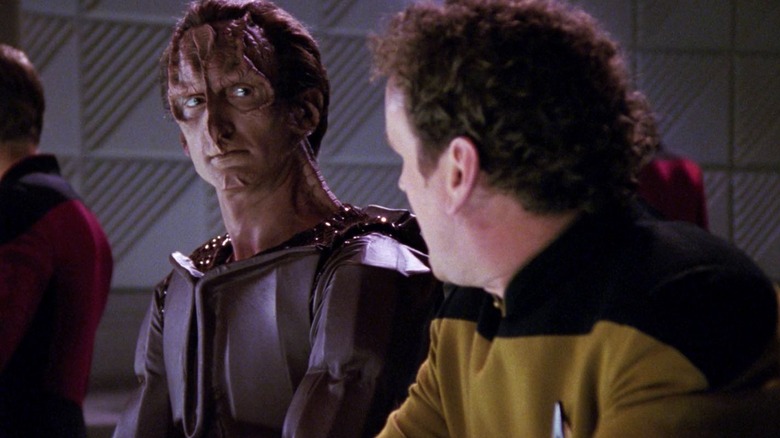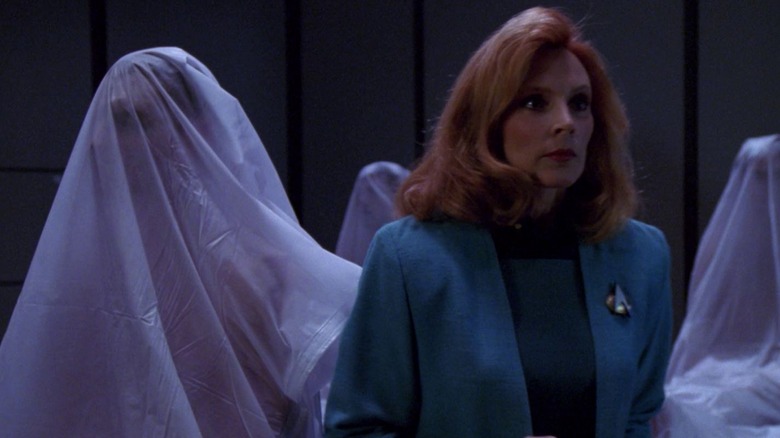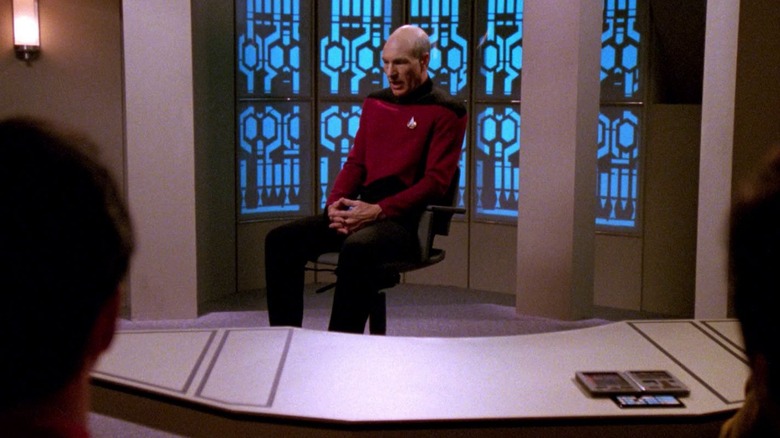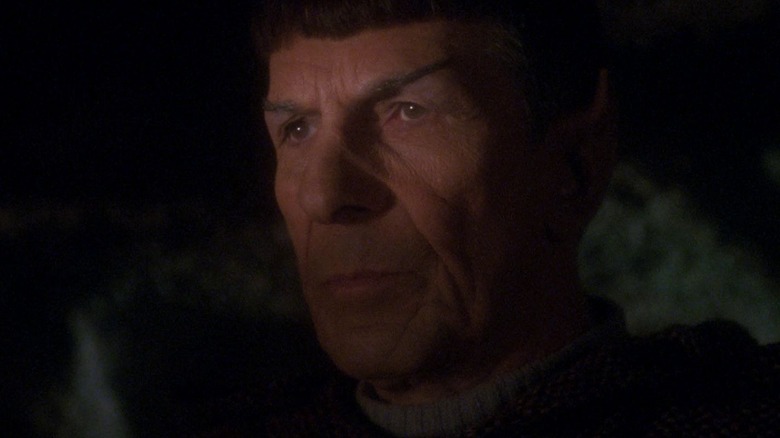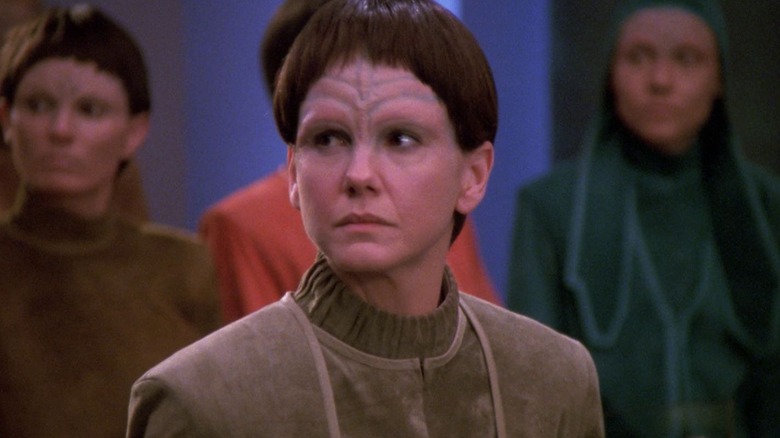A Legendary Star Trek Writer Has Died – These Are Her Essential Episodes
On Facebook, longtime "Star Trek" production designers Mike and Denise Okuda announced the passing of Jeri Taylor. She was 88.
Jeri Taylor was one of the key producers and writers throughout the 1990s "Star Trek" heyday, having joined the staff of "Star Trek: The Next Generation" in its fourth season. Trekkies will tell you that "Next Generation," having already hit its stride, broke into a sprint in its fourth season, producing multiple capital-G great episodes at that time. Taylor's impeccable writing contributions to "Next Generation" were so widely recognized that she was promoted to the role of co-executive producer of the series in its sixth season, overseeing most of the production alongside head honchos Rick Berman and Michael Piller. In the show's seventh season, Taylor became the full-bore showrunner.
Taylor wrote multiple scripts for "Next Generation" and is credited for co-creating the Cardassians, a fascistic species that would go on to play a large role on "Star Trek: Deep Space Nine." Along with Berman and Piller, Taylor was the co-creator of "Star Trek: Voyager," and she served as the show's executive producer and one of its writers. For the fourth season of "Voyager," Taylor served as its head writer and showrunner. Taylor even authored three tie-in "Star Trek" novels. She officially retired from the "Star Trek" game, and from writing altogether in 1998, having ushered the franchise through its best years.
Below are some of Taylor's more notable "Star Trek" teleplays. One will see how overwhelmingly important she was to the health of the Enterprise's missions.
'The Wounded' introduced the Cardassians into 'Star Trek'
In "The Wounded" (January 28, 1991), the Enterprise is attacked by a Cardassian ship, seemingly unprovoked. The Cardassians are a dastardly species that has always had a spiky relationship with the Federation, and multiple conflicts have left them as something of an enemy. It's explained, however, that the Cardassians were merely retaliating against an attack they experienced a few days earlier. Captain Picard learns that a vindictive Starfleet captain named Benjamin Maxwell (Bob Gunton) was attacking Cardassians with unshared evidence that they were up to no good.
The episode is notable for a scene wherein Miles O'Brien (Colm Meany), who once served under Maxwell, admitted that he carried a powerful prejudice against Cardassians. He knows other Cardassians committed brutal murders during past conflicts, and he hasn't been able to get over his resentment.
"The Wounded" is a classic tale of wounded men perpetuating violence, and how war continues to kill long after the conflict has ended. These are classic "Star Trek" ideas, and they were handled with aplomb.
'Night Terrors' is the scariest thing you will ever see in Star Trek
In "Night Terrors" (March 18, 1991), the Enterprise discovers a derelict ship, the U.S.S. Brattain, with only one living crew member. Everyone on the ship seems to have murdered each other or killed themselves. The only survivor is awake but frozen in perpetual fear. Everything on the Brattain works, but it cannot activate. Soon, the Enterprise also becomes mysteriously unable to move. Counselor Troi (Marina Sirtis) has nightmares of a whispering tunnel, and the rest of the crew begins hallucinating. Commander Riker (Jonathan Frakes) finds snakes in his bed. Dr. Crusher (Gates McFadden) sees corpses sitting upright on their autopsy tables.
"Night Terrors" isn't just the scariest episode of "Star Trek," it's one of the scariest things ever, period. The tone is nightmarish and dizzying. The scene of Dr. Crusher and the corpses gave this viewer legitimate nightmares. The ultimate explanation is equally scary. It seems that local radiation has robbed the crew of their ability to reach R.E.M. sleep, preventing them from being truly rested. It's not an insidious alien species behind the madness. It's just madness.
'The Drumhead' is 'Star Trek' at its most moral
In "The Drumhead" (April 29, 1991) there was an explosion in the Enterprise's engine room when its dilithium chamber ruptured. Foul play is immediately expected, as such a vital area of the ship would be closely protected and monitored. An investigator named Nora Satie (Jean Simmons), the daughter of a legendary Federation judge, is called to the Enterprise to find any potential saboteurs.
Satie is aggressively thorough and openly suspicious of everyone. Her investigations uncover a Klingon spy on board who had been sneaking information to the Romulans, but she was unable to prove that he was responsible for the explosion. She finds a junior officer who is partially Romulan and accuses him of sabotage merely because of his lineage. Meanwhile, the Enterprise officers found that there was no sabotage. It was merely an engine part wearing out due to run-of-the-mill mechanical fatigue.
Satie is not satisfied, however, and begins to interrogate Picard himself, questioning his loyalty. She sees enemies everywhere. Angry, wounded people in positions of legal power, we see, are the most dangerous, as they allow an environment of hostility to grow into prejudice and oppression. "The Drumhead" contains the following speech from Picard:
"You know, there are some words I've known since I was a schoolboy. With the first link, the chain is forged. The first speech censured, the first thought forbidden, the first freedom denied, chains us all irrevocably." Those words were uttered by Judge Aaron Satie as wisdom and warning. The first time any man's freedom is trodden on, we're all damaged."
Picard's speech in "The Drumhead" is considered one of the most famous speeches in "Star Trek" history. Jeri Taylor gave us that.
The Vulcans return in 'Unification'
When "Star Trek: The Next Generation" first began, show creator Gene Roddenberry mandated that Vulcan be barred from the series, at least initially. Roddenberry wanted the series to be unique and didn't want viewers to draw any parallels to Spock (Leonard Nimoy) from the original series.
With "Unification" (November 4, 1991), however, Spock was brought back into the fold, just in time for the franchise's 25th anniversary. The episode saw Picard and Data (Brent Spiner) going undercover as Romulans to find out what Ambassador Spock was doing by secretly communicating with the Federation's worst enemies. They eventually discover that Spock has been, for many years, quietly negotiating peace between Vulcan and Romulus, having found a secret cabal of Romulans who long for peace.
While the inclusion of Spock was a move of mercenary nostalgia, Taylor's handling of the character was refreshingly wise and tasteful. Spock, we see, has continued to act for the moral good, plying his diplomatic skills toward a long-fought cause. The character was allowed to grow and work, even while audiences weren't seeing him. Unlike modern shows, "Unification" isn't wistful or weepy. It's the logical next step.
'Star Trek' was clumsy but well-meaning about queerness with 'The Outcast'
In "The Outcast" (March 16, 1992), the Enterprise are working with a species called the J'Naii, a genderless species. Commander Riker finds himself in the company of a J'Naii named Soren (Melinda Culea), a welcoming co-worker. It's easy for the audience to see that the pair are growing attracted to one another, as they have frank conversations about sex, sexuality, and the concepts of gender. Soren eventually comes to confide in Riker that they are actually a she and that on the J'Naii homeworld, all expressions of gender are taboo. Indeed, anyone caught expressing either maleness or femaleness is immediately shipped off to cruel conversion camps.
This was clearly a metaphor for LGBTQIA+ rights, and how too many people have been prosecuted for their gender expression or sexuality throughout human history, but critics, even at the time, felt that the episode was too timid. Before "Star Trek" ever featured actual queer characters, the writers felt they had to couch queerness in alien metaphors. But then, an article in Salon, published in 2001, re-litigated the episode and found its criticisms of prejudice to be spot on, even if its queerness was eschewed.
Taylor has gone on record saying she wanted to tell a progressive queer-rights story in a sci-fi context, and her desire to be progressive is certainly admirable. She also admitted that not being queer herself, she might have been ill-prepared to write it. Regardless, it's one of the more notable episodes of the series and was certainly well-meaning in its intent. And, with the rise of trans rights in the political sphere, it has only become more salient.
